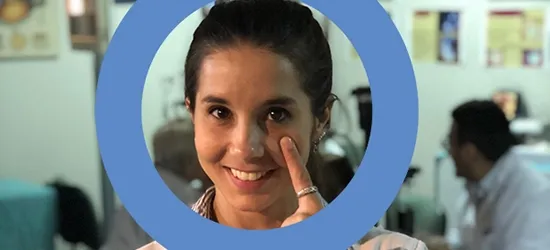Diabetic retinopathy is a complication of diabetes caused by the deterioration of arteries and veins that irrigate the retina that can cause severe loss of sight, and even blindness.Almost all the people who suffered from diabetes for several years have some degree of retinopathy: therefore, they are essential that they attend the ophthalmologist at least once a year.
In this context, the ophthalmologist Guillermo Magnano, member of the Argentine Council of Ophthalmology, gave details to FM 89.3 about the “National Campaign for Diabetes Blind Prevention” that will be held this Friday, November 29 in 180 points of the country.
“It is a campaign organized by the Argentine Council of Ophthalmology every year, and consists of providing free care in private, public and all those who voluntarily adhere to diabetic people.To do this they must enter the Council page for more information, ”said Magnano.
He said that the study consists of “an eye fund by which a droplet is placed to delay the pupil and the vessels and arteries of the retina” are observed to detect “if this patient has injuries and the type of severity of them”, he added.
In this sense, he remarked that diabetes "is the most frequent cause of blindness in the world, between 35 and 75 years, that is, it is not exceptional for a diabetic patient to be blind but is highly frequent."“That patient can have diabetic pathology and be asymptomatic, has stadiums without knowing it, has advanced stages and can have symptoms of loss of vision in their different degrees.Nowadays it is counted with drugs and surgeries to prevent patients from staying blind, so the important thing to detect this pathology, ”said the doctor.
For all this, he said that from the Ophthalmology Council "we try to reach the community to become aware of the seriousness of this pathology.""One of the most affected organs in diabetic patients are eyes," he said.
Asked about the care of the general population in ocular health, the ophthalmologist said that "there is no awareness in the countries developed in the importance of ophthalmological controls in particular."
“The patient usually goes to the ophthalmologist for a change in glasses and that is the opportunity we have to detect other serious pathologies such as glaucoma, diabetic blindness and other pathologies that we can detect in the medical consultation.The use of glasses is the most frequent reason for consultation, although now there is a whole topic for the non -use of glasses, due to new technologies such as laser surgeries or intraocular lenses, which are increasingly sophisticated and that we offer to ourpatients to stop using glasses, ”he said.
Finally, he pointed out that the members of the Ophthalmology Council are "very against the light recipe."“Many times the lenses are in charge of optics, and we fight them in a very aggressive way from the Council because it is a simplistic attitude with which we are not solving the underlying problem of the patients.We are harming them because we are giving it a lens and we are patching a situation that can be dramatic for the patient in the medium term, ”he concluded.
On Friday, November 29, in 180 points of the country, free ophthalmological care for diabetic patients.Free, free and order of arrival.See headquarters and schedules in this link: Link


